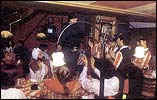











 |
Leisure Pays!
(Contn.)
The playing fields
 The leisure phenomenon may have started
south of the Vindhyas, but it is now national in scope. Ahmedabad, for
instance, could see as many as 29 leisure hot spots like multiplexes,
malls, water parks, and amusement parks being set up over the next two
years. And Chennai still remains on top of the heap. That's where Karti
Chidambaram, (son of former Finance Minister P. Chidambaram, if that's
relevant) runs a hot spot Down Under, that boasts a four-lane bowling
alley, pool and snooker tables, video games, a karaoke bar, a dance floor,
and a theme restaurant. He's now considering expanding to cities like
Bangalore and Coimbatore through the franchise route. Indeed, bowling
centers and pool bars-with hard-to-miss names like Snowbowling and Wild
West-are now part of the Chennai cityscape. The leisure phenomenon may have started
south of the Vindhyas, but it is now national in scope. Ahmedabad, for
instance, could see as many as 29 leisure hot spots like multiplexes,
malls, water parks, and amusement parks being set up over the next two
years. And Chennai still remains on top of the heap. That's where Karti
Chidambaram, (son of former Finance Minister P. Chidambaram, if that's
relevant) runs a hot spot Down Under, that boasts a four-lane bowling
alley, pool and snooker tables, video games, a karaoke bar, a dance floor,
and a theme restaurant. He's now considering expanding to cities like
Bangalore and Coimbatore through the franchise route. Indeed, bowling
centers and pool bars-with hard-to-miss names like Snowbowling and Wild
West-are now part of the Chennai cityscape.
Space isn't really a problem even in choked
metropolises like Delhi and Mumbai. Most people prefer to restrict their
leisure activities to the weekend and do not really mind travelling a bit
to reach their destination. Expectedly, the highways leading out of Delhi
and Chennai are dotted with amusement parks.
For the love of money
 It doesn't take much to get into the
leisure business. For as little as Rs 2 lakh one can have a mid-sized pool
bar up and running (which could explain the proliferation of this leisure
format). Bowling arcades are a little more expensive: a four-lane one
could set the investor back by a cool Rs 1.5 crore. The real big-ticket
items are water parks (estimated cost for one with a nominal five rides:
Rs 10 crore), amusement parks (using the same definition: Rs 40 crore),
shopping malls (a function of real estate prices really, but around Rs 50
crore for a mid-sized one, and golf courses (Rs 50 crore). It doesn't take much to get into the
leisure business. For as little as Rs 2 lakh one can have a mid-sized pool
bar up and running (which could explain the proliferation of this leisure
format). Bowling arcades are a little more expensive: a four-lane one
could set the investor back by a cool Rs 1.5 crore. The real big-ticket
items are water parks (estimated cost for one with a nominal five rides:
Rs 10 crore), amusement parks (using the same definition: Rs 40 crore),
shopping malls (a function of real estate prices really, but around Rs 50
crore for a mid-sized one, and golf courses (Rs 50 crore).
Sustaining a leisure business, especially
one built around recreational activities like gaming, isn't easy. Says
Dipankar Haldar, a consultant with KSA Technopak: ''The very nature of the
business is such that it thrives on excitement and innovation. People need
a reason to keep coming back.'' Agrees P.K. Vinod, the Marketing Head of
Kishkindha, a joint venture between the Malaysia-based Berjaya Holdings
and film-production company Navodaya, and the largest amusement park among
the cluster of these around Chennai: ''We have to introduce something
every three years. If we don't, the number of people visiting us
declines.''
|

THEME
RESTAURANTS:
That the restaurant business is growing at 50 per cent, we know.
What its size is, no one does. ''There are no all-encompassing
estimates. But theme restaurants and chains account for Rs 200
crore,''
says Dipankar Halder, Consultant, KSA Technopak. And the bigger
among these like the Mumbai-HQed Mars Restaurants-ICICI just
acquired a 20
per cent stake
in it-which runs 10 theme-eateries like Trim with Taste, Just Around
The Corner, and Not Just Jazz By The Bay in the city are now setting
their sights higher. Says Sanjay Narang, CEO, Mars: ''We have
national ambitions, and the 10 different themes running in Mumbai
will soon be franchised in Chennai and Pune.''
The reason for the theme-boom? It
takes a mere Rs
50 lakh an
outlet to get things off the ground. And there's a huge market
waiting to be served out there: 28 per cent of
respondents to a KSA Technopak study picked eating out as a
preferred leisure activity this year. That's certainly food for
thought. |
Worse, activity-based centres run the risk
of being based on things that go out of fashion quickly. Ask Mukesh Goyal,
the entrepreneur behind Ahmedabad's once-successful (and it's only two
years old) water park who's seen the Rs 10 crore he's pumped in to sustain
customer interest go waste: ''Customers are mad. When they like something,
they go berserk over it. Then we pump in money to meet demand and they
lose interest.''
Stories like this will become rarer as
large companies enter the business. Apart from being able to invest
periodically in the business, these corporates will approach the business
of leisure as they do any other business. Explains S.K. Nanda, Managing
Director, Gujarat State Finance Corporation: ''Money will not be that much
of a problem once the big guys enter the business. These companies will
also come in with better business plans and a research-based understanding
of the market.'' He points to the Rs 100 crore that the DLF Group has
invested in its Gurgaon golf course to prove his point. The man may have a
point: up-scale malls really took off after the entry of the (Ajay)
Piramal Group and the Ansals; food-retailing after that of the RPG Group's
Foodworld. If these companies succeed, they'll end up proving that fun is,
at the end of the day, a dashed serious business.
-Additional reporting by
R. Chandrasekhar and Nitya Varadarajan
|

